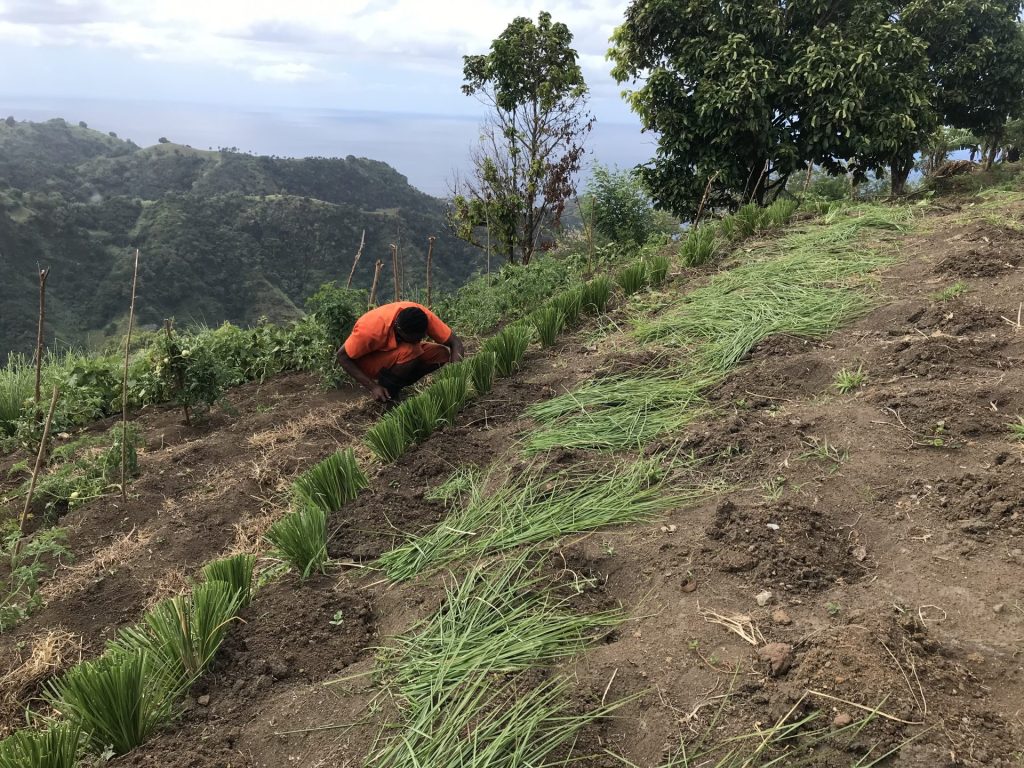The St. Vincent and the Grenadines Conservation Fund’s farmland restoration project designed and implemented by Hand2Earth has extended their north leeward vetiver project to set up sustainable contour farming in Belle Isle Correctional Facility .
Prison Officer Kevly Gould of Spring Village and 14 prisoners from the Belle Isle
Correctional Facility were trained in Vetiver Systems Technology over a three-week
period in August 2022. Prison authorities then identified an area to set up a vetiver
nursery and farm in the prison grounds. A nursery of 300 plants and several contours
were planted with vetiver. Crops were then planted in between, enabling the sloping
lands to be cultivated sustainably by preventing soil loss.
Apart from the training, the SVG Conservation Fund/Hand2Earth project donated hand
tools, waterboots, seeds and vetiver plants for the project which has expanded to
become an exemplary vetiver systems farm site. Presently occupying approximately 1.5
acre it is a prime demonstration site for soil regeneration and eco-agricultural practices
that directly link to St. Vincent’s agri-heritage.
According to Hand2Earth’s project manager, the Belle Isle area was traditionally covered
in productive farms terraced with vetiver grass. This project has enabled the prisoners to put their training into practice and experience the benefits of farming with vetiver to reintroduce the practice of terrace farming to the area, and also to practice the system when they leave prison.
Just three months after its inception, the vetiver farm provided a valuable contribution to sustainable farming practices at the prison was supplying the prison kitchen with a wide range of vegetables; tomatoes, okras, egg plant, lettuce, watermelon, sweet peppers and
carrots.
Officer Kevly Gould is proud of the dedication prisoners have shown to the project. “My
team [of prisoners] has motivated me to expand the project from its initial area to what we have now. The enthusiasm they have shown shows the benefits of learning new skills that will assist them when they come out of prison. We are really reaping the benefits in healthy produce for the prison kitchen.”
The project uses local neem and other natural pesticides on the farm. The insect
repellent properties of vetiver grass also provide for healthier crops. Despite the dry
season having set in, the farm area is green and well-irrigated with adequate ground
water retained by the vetiver root system
The prison vetiver farm has received three visits from farmers from Petit Bordel,
Troumaca, Rose Bank, Coull’s Hill to exchange experiences of working with vetiver
systems in their farms. This is part of Hand2Earth’s community education activities of scheduled guided tours of project vetiver farm sites.
Acting Superintendent of Prisons Dwain Bailey states “The vetiver farm project is one of our rehabilitation programs that has really benefited the inmates, producing vegetables
that have gone directly to their diet. The visits by local community groups to the prison
farm where prisoners interact with community members and learn from them as we asshare knowledge has benefited them tremendously. This has helped them feel part of something bigger than themselves and engineer a spirit of self-worth. Vetiver grass can also be harvested for the prison craft program which is another program that has added value to the prisoners lives. I want to thank Ms. Roudette who has spearheaded the
program and look forward to working along with her to benefit the inmates at His
Majesty’s Prisons and to benefit the society as a whole.”
Vonnie Roudette, Hand2Earth’s Project Manager states “We are delighted to expand this community project to partner with H.M. Prisons in reclaiming the practical knowledge that enabled farmers to supply the region with agricultural produce in former times through productive contour farming. This natural way of stabelising farmland and enriching the soil is timely as we work together to build healthy food systems in SVG.”
Hand2Earth is a locally based NGO that partners with communities to bring local knowledge and experience to bear on eco-based solutions for soil restoration, eco-ivelihood creation and
sustainable use of natural resources




